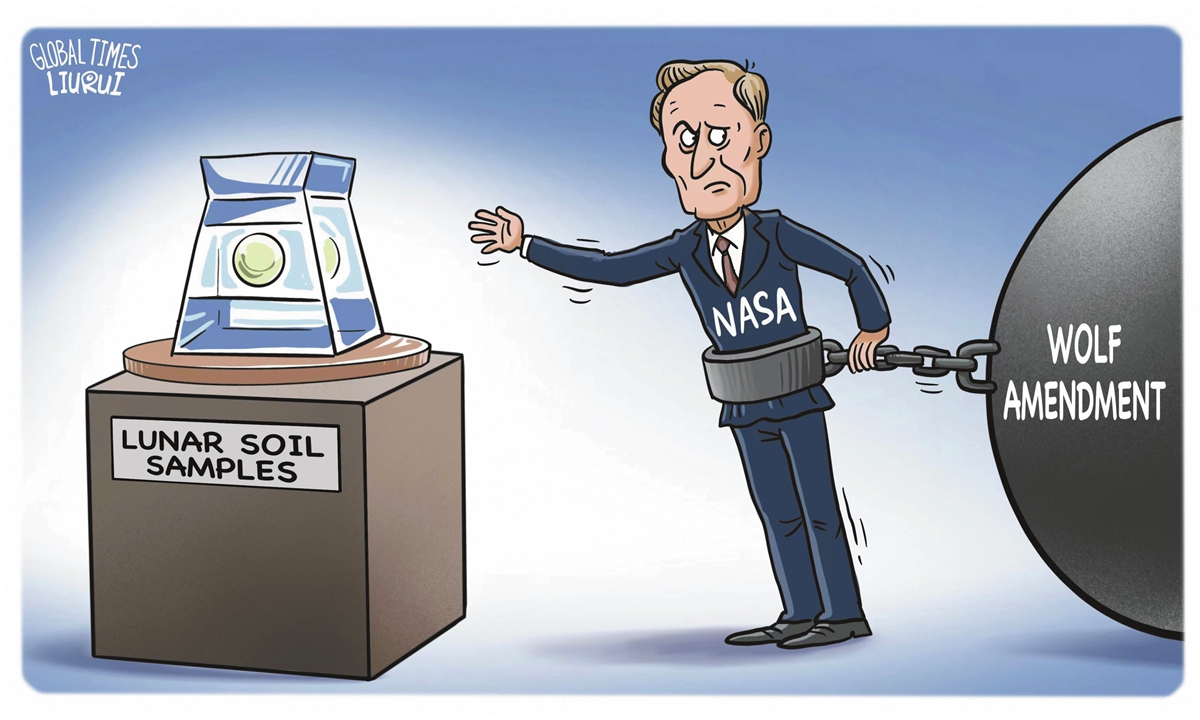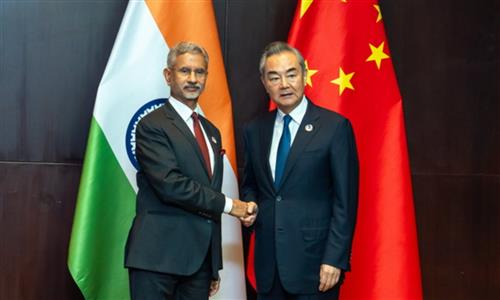US' predicament in seeking lunar soil samples from China a self-inflicted problem

Illustration: Liu Rui/GT
The lunar soil samples collected by China's Chang'e-5 spacecraft have drawn significant attention from the US. According to Reuters on Wednesday, NASA Administrator Bill Nelson stated that NASA and Chinese officials are engaged in talks to let American scientists analyze the samples, expressing that the talks will end "positively." However, the report also reveals that some US officials are hesitant about a potential agreement thinking it could weaken the US posture of toughness toward China. This highlights the distorted mind-set underlying the desire for US involvement in studying the Chinese samples while not giving up its zero-sum approach in its relationship with China.
NASA has been eagerly eyeing the lunar soil samples brought back by Chang'e-5 for quite some time. Since October of last year, when China announced that the Chang'e-5 lunar samples would soon be open to international applications, NASA has shown great interest in the samples. Reports have even revealed that an internal NASA email stated the application for access was necessary because of the "unique value" of the Chinese samples, which had been "made available recently to the international scientific community for research purposes." However, a US domestic law known as the Wolf Amendment has significantly hindered a range of China-US space collaborations, including joint research on lunar soil.
The Wolf Amendment prohibits the use of government funding by NASA, the White House's Office of Science and Technology Policy, or the National Space Council for any collaboration, hosting, or bilateral coordination with China or Chinese-owned companies without certification from the FBI. This strict, bigoted ban has become a self-imposed constraint for the US in the area of space cooperation with China.
Amid the continuous exaggeration by US politicians of the "China space threat" theory, NASA has consistently viewed China as a rival, attempting to suppress and block its space development. However, the US doesn't hesitate to seek China's lunar soil samples and share the fruits of China's space exploration when it suits its own needs. The US has apparently displayed a double standard. Shen Yi, a professor at Fudan University, told the Global Times that the reason for this hypocrisy is the US' persistent belief that it remains the most advanced country in space exploration.
Moreover, the Wolf Amendment, intended to limit China's space development, has utterly failed. On one hand, China's space industry continues to advance rapidly. On the other hand, many in the US aerospace sector have come to realize that the law has effectively backfired, restricting American technological progress. Keeping the Wolf Amendment is in "every sense a bad idea" for the US.
Shen believes the US' self-imposed restriction is the inevitable outcome of American hegemony. The Wolf Amendment has caused the US to lose its ability to progress while also preventing potential collaborations with China. Ultimately, this predicament is one that the US has brought upon itself.
China's stance on space exploration cooperation has always been clear: The country's collaboration with international partners is based on equality and mutual benefit, leveraging their respective scientific resources, facilities, and expertise. China has also consistently been open to exchanges and cooperation with the US in this field. Yet, the primary obstacle to current China-US space cooperation lies in irrational legislation in the US, such as the Wolf Amendment, as well as the US Cold War mind-set that treats China as a rival. Bian Zhigang, deputy head of the China National Space Administration, once emphasized: "If the US side sincerely hopes to promote cooperation between the two countries, it must take practical measures to remove these obstacles." By insisting on a hardline stance toward China, the US is allowing its space sector to be further poisoned by anti-China politics and containment strategies, thereby weakening and hindering beneficial cooperation between the two nations while closing the door to broader exploration opportunities.



